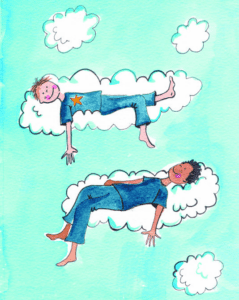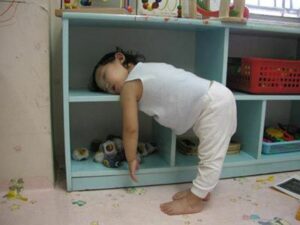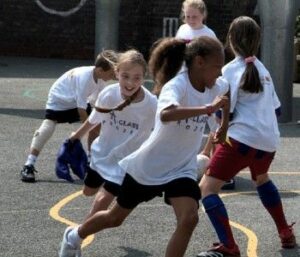Bedtime Routines and Sleep

“Encouraging your child to sleep…is as important as ensuring they eat properly and go to school.”
Professor Tanya Byron
Sleep – what does it do?
Sleep is crucial to all of us, especially to children and young people whilst they are still growing. Children need sleep because:
- it is needed for physical and mental development
- it recharges their batteries so they have energy
- it is needed for memory, learning and growing
- it helps keep their immune system healthy so they can fight infection.
How much sleep is enough?

Children aged 4-6 tend to need 10½ to 11½ hours sleep. At this age sleep problems are very common and most children will resist going to bed and may wake in the night. They may also be afraid of the dark. A good bedtime routine and gentle reassurance should help.
Older children, aged 6-12 need around 10 hours each night. They may have similar problems to us in getting to sleep and may worry about school, friends or family.
Remember though, that all children are different and their sleep patterns will vary. Try not to worry, the more anxious you are the more problems you might have getting your child to sleep.

“The more sleep deprived a child is, the more serious the behaviour problems. Extreme sleep shortage can even result in…anxiety or depression.”
Professor Tanya Byron
Sleep shortage has a big impact.
Professor Byron says that lack of sleep has a big impact on a child’s behaviour.
Children who do not get enough sleep can be affected in a variety of ways.
- difficulty in concentrating & paying attention
- behaviour – children can be on short fuse, become disobedient or act without thinking
- less able to focus or maintain their attention on a task
- less able to remember new things
- less able to think as clearly or use reasoning skills
- less able to solve problems
- less able to plan, carry out and monitor their own activities
- less able to understand and use language
- difficulty in recognising objects and putting things together
- cannot judge distances as well as normal – meaning they may fall over, bump into things or seem clumsy

What can I do?
Children who suffer constant sleep shortage can forget how to sleep and their bodies need to re-learn healthy sleep habits.
1. Consistent Bedtime Routine
It is such an obvious thing to say and it always looks so easy when you write it down. Establishing and sticking to a bedtime routine is actually very difficult especially when parents work or children are involved in clubs or activities. BUT…if you can do it, it really helps create a feeling of security for children. It helps mark a part of the day when the child moves from being full of fun, fun, fun to a time where things slow down. Children will learn that a specific routine before bed ends with sleep.

It is important to develop a routine that suits you. Each family’s bedtime routines vary but might include:
- a bath – try to keep bath toys to a minimum
- a short bedtime story (Find Bedtime Story Video’s at the bottom of this page.)
- a kiss and cuddle goodnight and then leave – staying with your child until they go to sleep doesn’t really help in the long term
Try to carry out the routine upstairs. Once you have started it, try not to let the child go back downstairs. Do stick with the routine, it can take several weeks before it begins to have a regular impact.
Try to remain calm. As parents, if your child isn’t getting enough sleep, you might not be either. You might find that your own tiredness makes you unable to think clearly or makes it hard to remain calm at bedtime.
We all have an internal body clock and in children it is programmed so that children get tired in the evenings. As the light starts to fade, the body is programmed to start to release melatonin which is the body’s sleep hormone. It is the body’s way of telling a child to “STOP”.
This is why exercise outside in the late afternoon or early evening helps, the body recognises even small changes in the amount of light which then trigger the sleep hormone.
To help this along, try turning down the lights in the house the hour before bedtime. Also make sure the bedroom is as dark as possible, even
the standby light from a TV, CD player or laptop can affect a child’s body clock.
3. Cosy Sleep Environment
Take a look at where your child sleeps. It can be one of the key ways of improving sleep. Make sure the room is not too hot or too cold. Are the bed covers and pyjamas comfy? And crucially – where’s teddy? Cuddly toys or favourite blanket help a young child cope with being alone at night.
Children don’t usually go straight to sleep, just like us. So they may talk or sing to themselves or read a little until they fall asleep.
4. Minimise Distractions
For some children, their bedroom is a multi-media centre with TV, DVD-player, video game and mobile phone. Current advice is to avoid computer games and computer use for an hour before bed. Watching TV stimulates the brain and so try to avoid watching TV in bed. A key message from all the experts is…
“DON’T LET CHILDREN HAVE TOO MANY DISTRACTIONS AT BEDTIME”
Activities such as jigsaws, puzzles or colouring are very relaxing. In spite of what you might think, we find that even our oldest, toughest Year 6 children enjoy colouring, it has a uniquely calming effect. Try to avoid rough and tumble play before bedtime.
5. Eat better to sleep better
The food your child eats can affect their energy levels and sleepiness. Foods that are high in carbohydrates have a calming effect whereas foods high in sugar or protein make a child more alert. So if you are having supper before bedtime, try a snack based on carbohydrate such as toast, bagel, porridge or a non-sugary cereal.
Caffeine is not just in coffee. It is in tea, chocolate and many fizzy drinks including Lucozade, Cola drinks and other energy drinks. The Food Standards Agency has found that caffeine can temporarily affect children’s behaviour by making them irritable, nervous or anxious.
Caffeine can stay in your body for many hours after the last drink was drunk.

6. Get Active
Exercise has a really big impact on sleep and many children do not get enough daily exercise. Too much TV or computer games along with a lack of physical activity can prevent good sleep. It is especially helpful for children to do some exercise in the late afternoon or early evening just before tea. Exercise later on in the evening may disturb sleep for children.

We have many after school clubs – encourage your child to join one of the more physical clubs.
If you can get the children outside for a run around, that is great, this will help set their body clock too. If you don’t have access to a safe outside area, then running on the spot, star jumps and going up and down stairs can work.
7. Teach your child how to relax and fall asleep
A good start is the bedtime story. When listening to a story, children will tend to lie still and focus on the story, keeping your body still sends messages to the brain which encourage relaxation and sleep.
Worries
If a worry is keeping a child awake at bedtime, you probably won’t be able to deal with it right away so write it down. Older children can write it down, younger ones can draw it, then tell them you will deal with it tomorrow and take the piece of paper out of the bedroom.
Nightmares
Most children have nightmares occasionally. These dreams can seem real and very frightening. Children will usually remember the dream and will need to be comforted and reassured to get back to sleep. The next day it may help if you encourage your child to talk about the dream or draw a picture of it. Nightmares may be caused by worries that a child is having; talking about the dream and drawing may help you to find out what is causing the nightmare.
8. Don’t panic, help is at hand.
Sleep problems are very common and most problems get better on their own. If they don’t then you can start by seeking advice from your GP or Health Visitor. If the sleep problem is serious, you may be referred to a specialist sleep clinic.
Useful links and contacts:
- Your GP or Health Visitor
- Relax Kids www.relaxkids.com
ACTIVITY
Get older children to work out their bedtime by working backwards. Start from the time you need to leave the house in the morning to get to school. Use a clock with hands to help.

What time do you need to leave the house to get to school?

How long does it take to get washed, dressed, clean your teeth, eat your breakfast, go to the toilet, get your coat on?

Allow some “down time” – seems like a luxury and can be eaten up by squabbles, waiting for the bathroom, searching for missing socks, hair bobbles, lunchboxes and PE kits!

So all of that could take up to an hour.
What time does that mean you need to get up?





